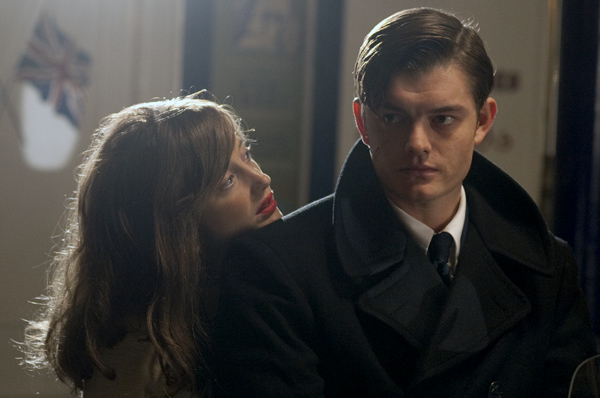|
Reviews of Recent Independent, Foreign, & Documentary Films in Theaters and DVD/Home Video

BRIGHTON ROCK (2010) The new Brighton Rock lifts Graham Greene’s crime drama out of the decade of his 1938 novel and the 1947 rough-and-tough Brit noir and plops it in 1964, when capital punishment by the noose was still on the books and the Beatles were beginning their reign. Fortunately, the time shift hardly makes a dent in Greene’s story. A side by side comparison of the two film adaptations would find more in common than not, but neither does the pre-Swinging Sixties setting significantly enhance the looming melancholy, though this is really the last time period when Greene’s puzzle pieces could fall in place. A later, more sexually liberated, and less sheltered society would deflate the motivations of at least one of the lead characters. Pinky, a dapper 17-year-old hood, cuts a bloody swath up the gangland ladder in the holiday resort of Brighton, which has seen better days. (A lethal hard stick of locally-made candy gave Greene his title.) The only witness who can possibly connect him to the death of a rival gang member is Rose, a bystander and a waitress at a local tea room. To hedge his bets, he begins a campaign of seduction—she can’t testify against him against her will if they are married. But the (first) man that Pinky kills is the sometime-boyfriend of Ida (Helen Mirren), Rose’s mother hen/manager. She’s onto Pinky right away and single-handedly crusades to unmask his crime. With her eye-for-an eye agenda, Ida’s the story’s least complicated and solid character—an amateur detective, the film’s voice of reason, and its savior, all rolled up into one. The role of Rose is almost impossible to play: a withdrawn and obedient 17-year-old girl who transfers her religious devotion from the Catholic Church to a cold-hearted hoodlum she realizes is a murderer, and whom she has only known for a couple of days. Greene took umbrage to the “Catholic writer” label, insisting he used faith as a framework, as something intrinsic to his characters and a counterpoint to their actions. Luckily, the filmmakers didn’t jettison the religious overtone, which they at one point considered. The plot wouldn’t make sense otherwise. However, Rose deflects every obvious moral objection to what Pinky asks of her. She has to make huge leaps of judgment without coming across as crazy (Greene never makes justifications that easy) and that are in extreme opposition to her upbringing. That’s not to say that actress Andrea Riseborough isn’t convincing, or that the script doesn’t makes an effort to shed some insight into Rose’s background—motherless, she lives with an abusive drunk dad. This explains some of her neediness, but it’s not enough. Running a wild gamut of emotions, Rose may be best suited for opera. She’s the most likely reason a short-lived 2004 musical version was mounted in London. On the other hand, the part of the self-destructive Pinky is no cakewalk on the pier, either. Compared to his star-making role as Ian Curtis in Control, Sam Riley gives a muted, head down and growling performance, cool and defensive. He roughly courts Rose, practically dragging her by her arm, and keeps his shield up. Too tightly wound, Pinky gives off just small sparks, yet there has to be a reason why Rose hopes Pinky really loves her or why she trusts him. (Strangely, the new Rock is no more sexually frank than the first go round.) And unlike Richard Attenborough’s postwar Pinky, Riley has lost the baby face of a teenager. The film is ripe for Helen Mirren to grab, and she handily makes off with it. (She commits grand larceny in The Debt as well.) When the self-assured Ida purrs to John Hurt that she knows what men like, you not only believe her, but you start seeing a completely different (and unrated) movie in your head. Hermione Baddeley played her counterpart in 1947, and also had a field day. Another scene stealer is Andy Serkis as a slimy crime boss, in George Sanders’ All About Eve mode.
Nevertheless, for those not familiar with the novel or the earlier movie, this smoothly and tightly edited model still delivers suspense and plenty of twists and turns. And in another smart move, the filmmakers stick to the 1947 sadistic (for the audience) ending, co-written by Greene along with playwright Terence Rattigan. Without a shred of physical violence, it’s as harsh as a gangland hit.
KentTurner
|

